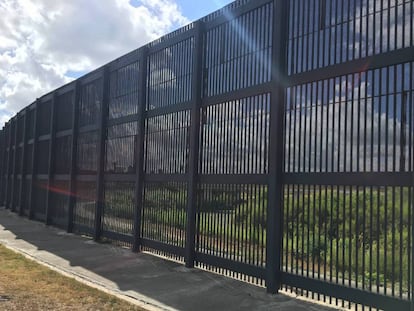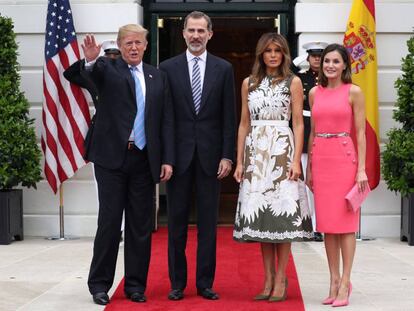¡°We are going to take the risk and go to the US, we can¡¯t go back¡±
President Donald Trump¡¯s new policy of separating migrant families is doing little to dissuade those fleeing violence and poverty
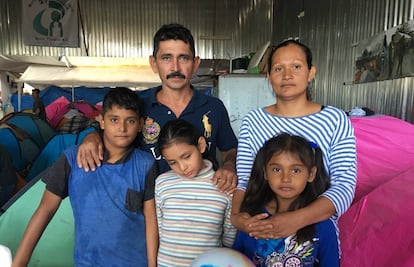

Donald Trump needs to try harder if he wants to scare Rafael Castillo. On May 2, Rafael finished his work cutting lemons in a field in Apatazing¨¢n, Michoac¨¢n. He passed by his parents¡¯ place then headed home. That¡¯s when he received the call: ¡°They have just killed your brothers.¡± Gunmen had shot two of his siblings, right in front of his parents, just 10 minutes after Rafael had left them. They buried the bodies that same afternoon. When he went home that night, armed men in SUVs were waiting for him outside his house. A friend of his wife¡¯s bought them plane tickets to Tijuana. They arrived the next day.
In my country, the only thing that awaits me is death
Carmen, from El Salvador
The 44-year-old tells his story, accompanied by his wife and his children, in the Juventud 2000 shelter, one of the many in Tijuana that takes in migrants who are planning to cross the border. Some are fleeing the violence in Michoac¨¢n, others from gangs in El Salvador, while others simply want to escape their miserable living conditions. Camped in tents in an aluminum-roof warehouse, 107 people wait for their turn to cross into San Ysidro in San Diego and ask the United States to give them a chance. Whole families live here, with dozens of kids, all waiting.
These families have come to the US border at a time when the US is cracking down on immigration by targeting children. President Donald Trump, through his general secretary Jeff Sessions, has introduced a ¡°zero-tolerance¡± policy where anyone caught illegally crossing into the country is charged with a crime. This means that migrants are sent to prison before being deported and separated from their children, who are put in the care of government social services. The policy, intended to dissuade people from entering the country illegally, has sparked a fierce political debate on immigrants¡¯ human rights.
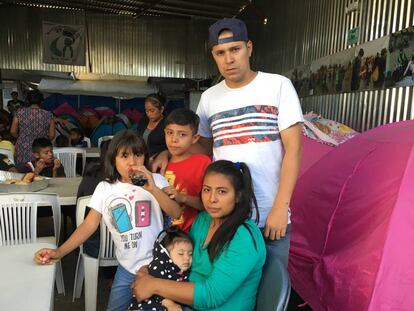
It is too soon to tell whether the policy is achieving its intended goal but Castillo for one has not been deterred. ¡°We are going to take the risk. We can¡¯t go back to Michoacan. We are going to see what happens,¡± he says. If they returned, they would be ¡°handing themselves over¡± to the killers, he explains.
The families in Juventud 2000 are going to enter the United States the way US Attorney General Jeff Sessions has recommended: they will go to an official entry point, present their case, and ask for asylum. They haven¡¯t considered crossing illegally.
But even so, immigration lawyers say there is no guarantee that they will be allowed to stay together on the other side, nor that they will be deported together.
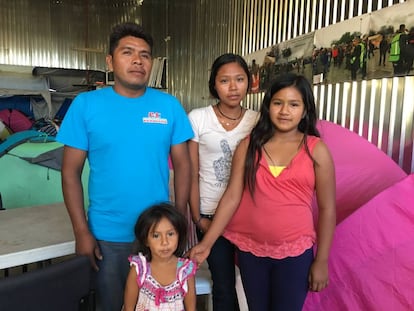
In early May, a group of 400 migrants from Central America passed through the Juventud 2000 shelter as part of a ¡°migrant caravan.¡± They did the same thing hundreds of people do every day: they presented their cases and asked for asylum.
Alex Mensing, the legal advisor for the group, says that in six cases children were separated from their parents ¨C without any explanation from the border police. This sometimes occurs when police do not believe a family is real but rather made up of traffickers smuggling children. Mensing, however, insists that ¡°they all had birth certificates and affidavits,¡± adding that it is unusual for families who enter legally to be separated.
There is no guarantee families entering legally will not separated
Immigration lawyer Alex Mensing
The margin to interpret asylum and immigration law is currently very wide but the current US government is determined to take away this discretion by always enforcing the most restrictive option. Even if they follow Jeff Sessions¡¯ instructions exactly, ¡°there is no guarantee the families in Tijuana will not be separated,¡± says Mensing.
Adults can spend ¡°up to eight or 10¡± months in detention waiting for a decision while their children are kept under the custody of social services. Some migrants cannot handle the separation and ask to be deported. Of the 400 migrants who crossed into the United States in May, 50 are still in prison and separated from their children.
There are at least two reasons why it is difficult to dissuade people from entering the country. Firstly, some migrants are able to cross with their children and stay on. They then send pictures from the other side and fill others with hope. And secondly, the reality that they are leaving behind is much worse.
Carmen, who is carrying her 10-month daughter Amber in her arms, fled from San Salvador because a member of the Mara 18 gang became obsessed with her and threatened to kill her if she did not stay with him. She is in Tijuana now with her husband Josu¨¦ and three children to ask for asylum. She has heard about Trump¡¯s new policy but says ¡°it hasn¡¯t changed my mind. If my children can stay there, [even if she is deported], I have hope that I will be able to see them again. In my country, the only thing that awaits me is death.¡±
Of the 400 migrants who crossed into the United States in May, 50 are still in prison and separated from their children
¡°Most of them are aware¡± of the family separations, says Jos¨¦ Mar¨ªa Garc¨ªa Lara, the manager of the shelter. ¡°Despite this, they intend to cross.¡± Some, who know they don¡¯t have sufficient grounds to ask for asylum, travel kilometers from Tijuana to try to enter illegally. ¡°Their need for security is more important than what could happen to them,¡± adds Garc¨ªa Lara. ¡°This is how it is. Imagine your family was in danger, this would be how anyone would logically think.¡±
As Mensing argues, dissuasion ¡°will only work if we create conditions worse than the ones they are fleeing. But then, what will we become? Worse than gangs?¡±
English version by Andres Cayuela.
Tu suscripci¨®n se est¨¢ usando en otro dispositivo
?Quieres a?adir otro usuario a tu suscripci¨®n?
Si contin¨²as leyendo en este dispositivo, no se podr¨¢ leer en el otro.
FlechaTu suscripci¨®n se est¨¢ usando en otro dispositivo y solo puedes acceder a EL PA?S desde un dispositivo a la vez.
Si quieres compartir tu cuenta, cambia tu suscripci¨®n a la modalidad Premium, as¨ª podr¨¢s a?adir otro usuario. Cada uno acceder¨¢ con su propia cuenta de email, lo que os permitir¨¢ personalizar vuestra experiencia en EL PA?S.
?Tienes una suscripci¨®n de empresa? Accede aqu¨ª para contratar m¨¢s cuentas.
En el caso de no saber qui¨¦n est¨¢ usando tu cuenta, te recomendamos cambiar tu contrase?a aqu¨ª.
Si decides continuar compartiendo tu cuenta, este mensaje se mostrar¨¢ en tu dispositivo y en el de la otra persona que est¨¢ usando tu cuenta de forma indefinida, afectando a tu experiencia de lectura. Puedes consultar aqu¨ª los t¨¦rminos y condiciones de la suscripci¨®n digital.
More information
